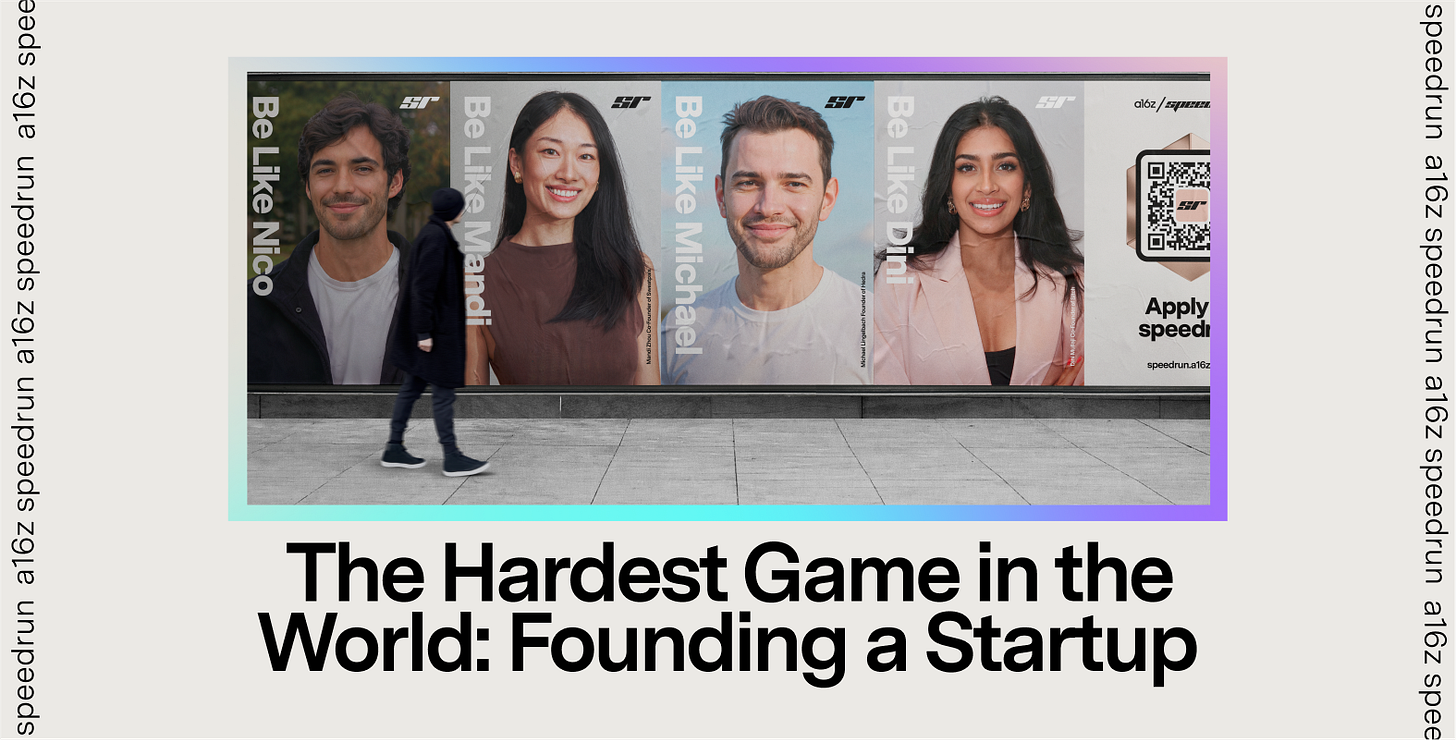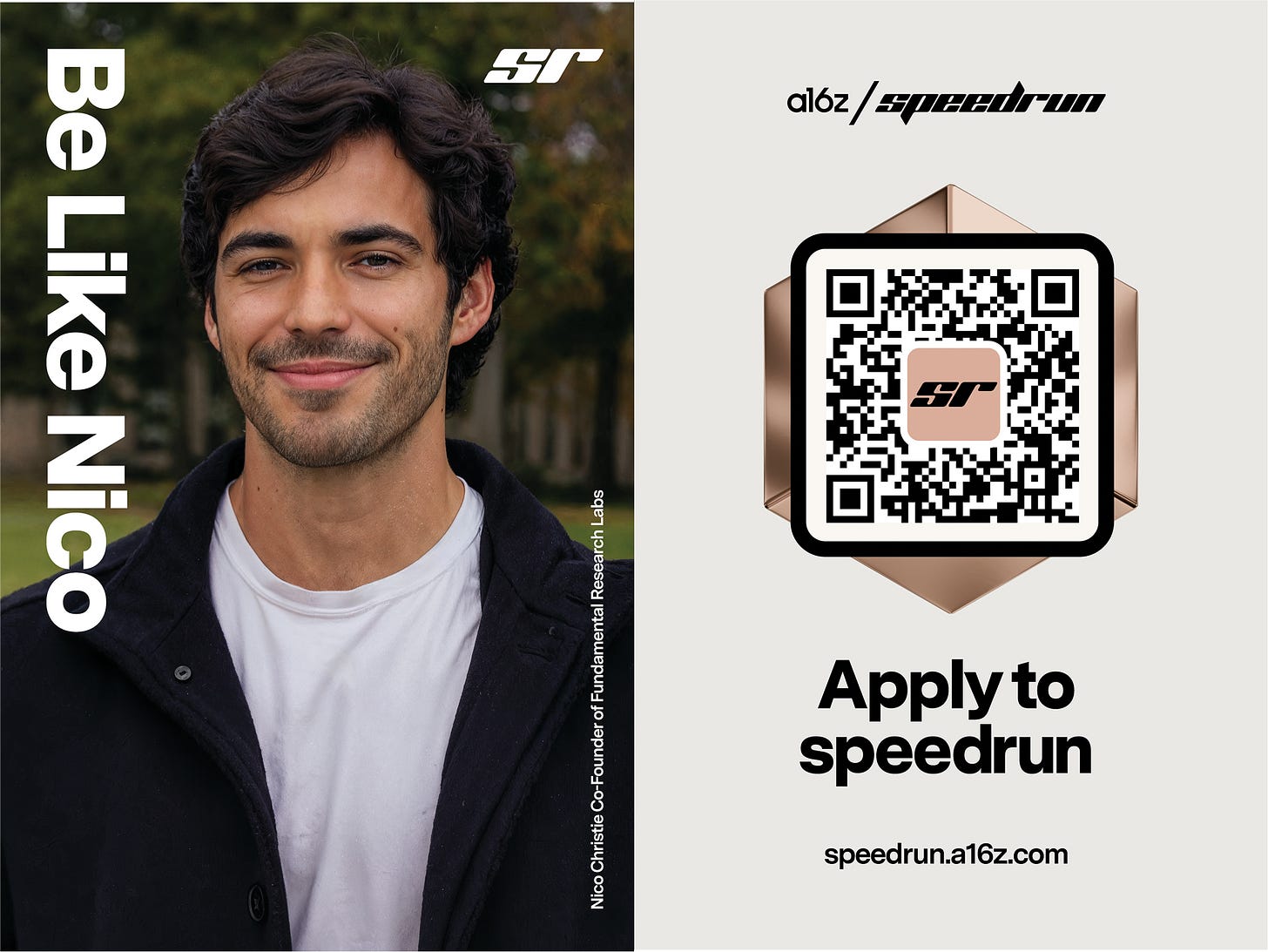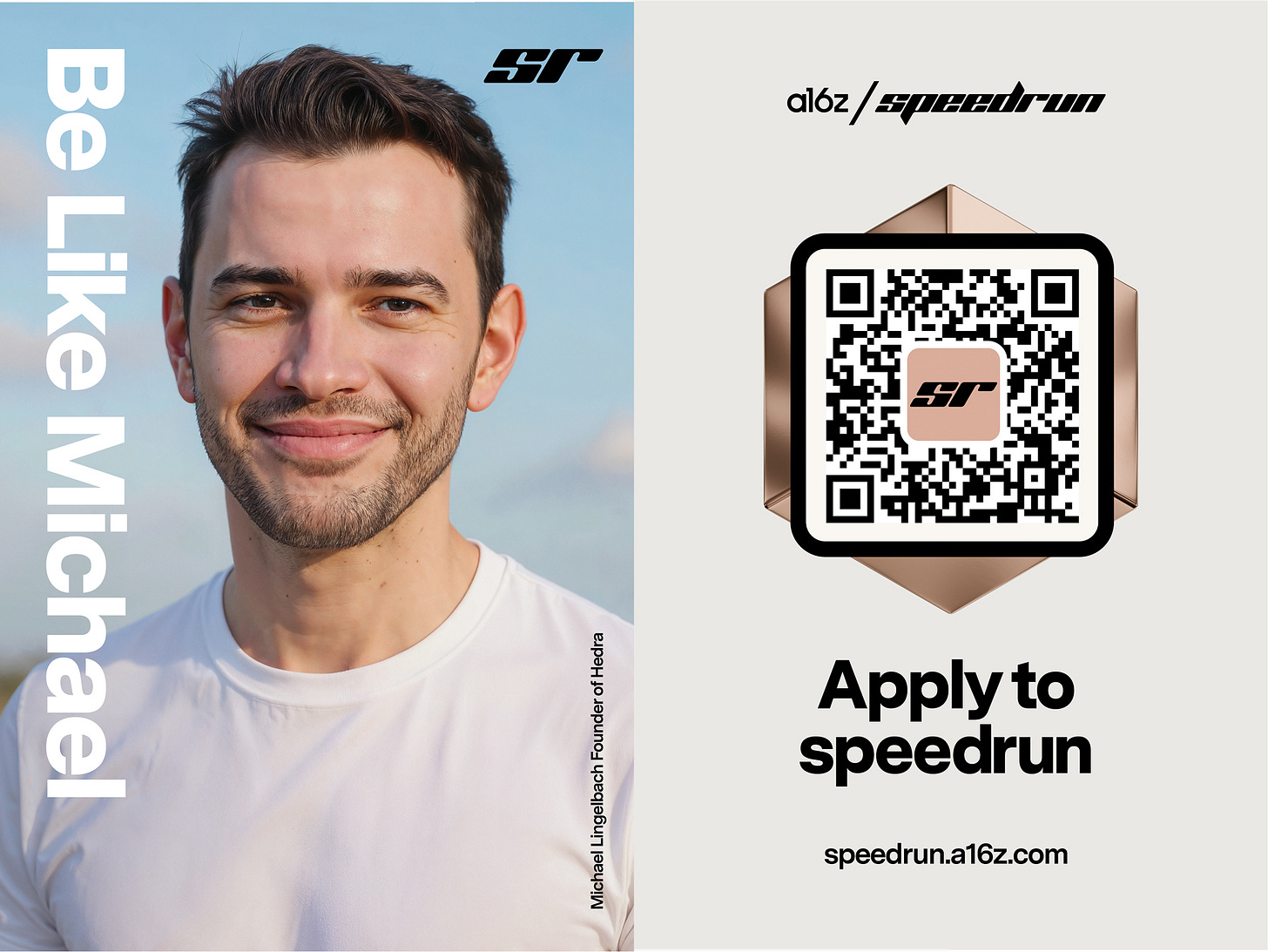The Hardest Game in the World: Founding a Startup
Four successful a16z speedrun alumni share advice—and warnings—for others considering the path of the startup founder.
💡 This Week’s Big Ideas
🧊 Applications for SR006 are open now through September 28th! Secure up to $1M for your startup by applying today.
🇨🇦 The a16z speedrun team is coming to Waterloo, Ontario. Register to join us for an in-person dinner on Friday, September 26th.
📦 Sam Shank explains why founders should “start by thinking about distribution.”
🏈 This Friday at 1:00pm PT Robin Guo and Ryan Rigney are hosting a live Q&A Office Hours with FanDuel co-founder Nigel Eccles. Repost Robin’s tweet and sign up using the link to join the call when it goes live.
💼 Join our talent network for more opportunities. If we see a fit for you, we'll intro you to relevant founders in the portfolio.
With under two weeks left to apply for speedrun’s class of SR006, we’re rolling out new IRL ads across San Francisco.
Echoing a famous ad campaign from decades past, the posters feature a call to “be like” four a16z speedrun alumni: Fundamental Research Labs’s Nico Christie, SweatPals’s Mandi Zhou, Hedra’s Michael Lingelbach, and Sitch’s Nandini Mullaji, each of whom has gone on to raise millions after graduating from SR.
We believe there’s room for far more people to become founders. But that belief comes with a caveat: startups are hard. Successfully building a company from 0 to exit requires a level of resilience normally associated only with elite soldiers or athletes—people who dedicate their lives to a mission.
Even the most successful founders who’ve come through speedrun say it’s not for the faint of heart. Recently we caught up with Nico, Mandi, Michael, and Nandini to ask about this more brutal side of the startup journey. We asked:
What’s been the hardest part of their journey so far?
What are the most expensive lessons they’ve had to learn?
What strategies have they come up with to stay sane when things get tough?
What follows may sound like a long list of reasons you shouldn’t start a startup. But we hope it comes off as a more useful strategy guide for the wary instead.
The Hardest Part of the Founding Journey
Nico Christie is obsessed with being the best in the world at things, and he’s tasted it before. As a college student at the University of Florida, he went semi-pro and became nationally renowned for winning basketball dunk contests. Especially given his 5’ 9” height, commentators always called out his “insane” aerial leaps.
Nico compares the challenges he’s taken on in his dunking career and now in his role as a founder to “slaying dragons.”
“Getting into speedrun is sort of conquering your first dragon,” he says. “And then you realize the next dragon is way bigger. This is every time you do anything. Every next round, every new product, every new hire.”
Nico says that after completing speedrun, things have only gotten harder. “You just get like a ton of battle scars,” he says, “But it makes you stronger. The goal is just to not die.”
By this stage of the journey with Fundamental, which recently raised a $33 million Series A round, Nico says he’s starting to feel like he can take on whatever dragon comes next, even if it does come at a cost to his health: “I’m probably going to die early,” he deadpans. “But that’s the game.”
Michael Lingelbach of Hedra says that one of the hardest things about being a founder is the constant rejection you face along the journey:
“You face rejection when recruiting, you face rejection when fundraising. Even if a team seems successful, they've all gone through a lot of rejection. And when you’re successful, there's a payoff—People that maybe rejected you before are suddenly calling you up, being like, ‘hey, I know I passed on that job a year ago when you were a seed-stage company, and now you're a Series A company. Let's talk. And that can be satisfying.
“But more often you'll spend six to 10 hours pouring your heart and soul out to someone selling them on your vision. And then like suddenly you realize they care more about the cash. That can be really demoralizing and can kind of cause you to lose a little bit of faith in Silicon Valley.”
—Michael Lingelbach, cofounder and CEO of Hedra
Nandini Mullaji of Sitch knows the pain of startups well. Her first attempt at founding a startup built around a dating app didn’t work. She says the hardest lesson to learn from that experience was that sometimes it’s just about timing.
“It’s been two years almost to the day since I shut down my first dating app. And when I think about the journey, I just think that sometimes you can be too early or you can be too late. And it's actually not about you.
“You can put in all of the effort and manage all of the inputs. But sometimes the market situation is just so different from what it needs to be in order for you to succeed. And it's really hard because the type of people who are founders are people who believe that they can change the world. But sometimes you’re just not the right founder, at the right time, with the right idea. And I think that's probably the hardest thing about being a founder: knowing that everything is not fundamentally under your control.”
—Nandini Mullaji, cofounder of Sitch
Expensive Lessons
We asked the four founders the same question: “What’s the most expensive lesson you’ve had to learn as a founder?”
All four came back independently with variations on the same answer: hiring mistakes.
Mandi Zhou, cofounder and CPO at Sweatpals, recounted a hiring mistake that then took too long to fix. “My most expensive lesson was rushing a hire and then hesitating to act when the fit was clearly wrong,” she says. “I gave too much grace, hoping things would improve, and it hurt team morale and slowed execution.”
Ultimately, Mandi says she had to recognize she had a blindspot as a leader. “Real kindness is being clear early, set expectations, give honest feedback fast, and if it’s not a fit, make the call. Caring personally means you don’t let someone stay in a role where they can’t succeed in.”
“You really have to optimize for the right leaders in your company early on. I think it's really tempting to promote individual contributors into leadership positions because they're really good at doing the work, but you have to realize that managing people and growing teams is a separate skill from being a really strong IC. At the same time, when you're an early-stage startup, you don't want to hire a bunch of career managers who don't know how to build zero to one.”
—Michael Lingelbach
Nico Christie recounted a similar experience he had, which occurred when he brought on an early senior hire that slowed down the speed of his team dramatically.
“All of a sudden our velocity went from shipping everything weekly, to needing six months for user testing,” Nico says. “We knew better. As soon as we ended that relationship everything turned around.”
When told that hiring mistakes had been the consistent answer from other founders to the question about expensive lessons, Nico nodded. “Yeah, that doesn’t surprise me,” he said. “You have to learn your own lessons, though, which is the problem.”
Maybe suffering through bad hiring choices is a lesson that every founder has to learn on their own.
Nandini Mullaji put it more bluntly. When it comes to making important hires or choosing a co-founder, she says: “You're going to have a few ex-boyfriends before you find your husband.”
Strategies for Staying Sane
So, assuming that all the warnings above have failed to scare you off and you still want to become a founder, what are some actionable things you can do to make the experience more bearable?
Michael Lingelbach says that one of the best things founders can do is to just work to create a company culture where people are empowered to solve their own problems:
“It’s really useful to use the Socratic method. I think one of the biggest failures of culture is if you just tell everyone the answer to everything. A lot of the early stage is about culture management. How do you keep people enthusiastic and bought in, especially when the product doesn't even exist yet? Part of that is that you have to be inspiring and paint the vision. But you also have to manage the process right. A lot of that is helping people come to the answer and feeling a strong sense of ownership over what they're doing. So I think this is something I still work on, but how can you empower people to come to the right answer versus just telling people what the right answer is?”
—Michael Lingelbach
Nandini Mullaji says there are three habits that have saved her sanity—and her relationship with her husband—as they both embark on founder journeys:
“I advise people to do three things:
I actually take a break from my phone. So I don't use social media from 8pm to 8am, and I’ve found that allows me to focus on what I'm actually doing.
If you have a partner, take a scheduled date night especially if your partner is also a founder. Because otherwise you will never see each other and you will never prioritize your relationship. My partner is also a founder. So we kind of joke that our whole company has Wednesday date night because I have Wednesday date night. Everyone knows I'm offline from 7 to 10pm.
The last thing: Get used to sending voice notes to your team. It is so much quicker and more efficient than writing long texts and emails and slacks. And I think that's just a great time-saving hack.”
—Nandini Mullaji
Mandi Zhou says to stay focused on the next step, and try to get in a workout:
“I get those emotional roller coasters sometimes, in the morning I feel I’m on the top of the world and then question myself and everything by afternoon and the imposter syndrome will creep in. I usually remind myself that this is not about me, my ego, it’s about the company and I should look forward and keep going because we have much bigger fish to fry. I try to stay focused on the next step forward instead of replaying doubts. Something that always works for me is to do a workout, even 30 minutes of workout or jogging outside can get me out of that head space, unstuck myself and see the bigger picture.”
—Mandi Zhou
Asked for any last advice for founders thinking about embarking on the startup journey, Nico Christie pauses. “There are going to be a lot of reasons for you to want to quit,” he says. “Unless you have a really good reason, you're going to fail.”
“So can you say why you're doing it?”
That’s it for this week. Thanks again to Nico, Mandi, Michael, and Nandini for sharing their hard-earned wisdom with us.
For more weekly dives into the world of early stage startups, subscribe to our newsletter below.










IN SHORT. It won't be pretty but if we do right things we'll make money damn near automatically